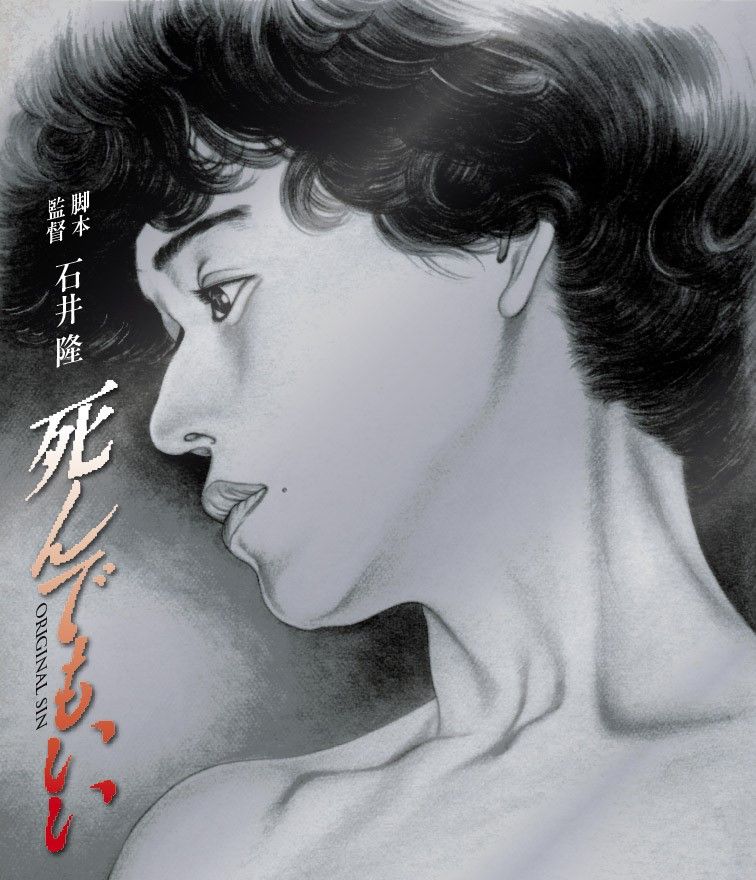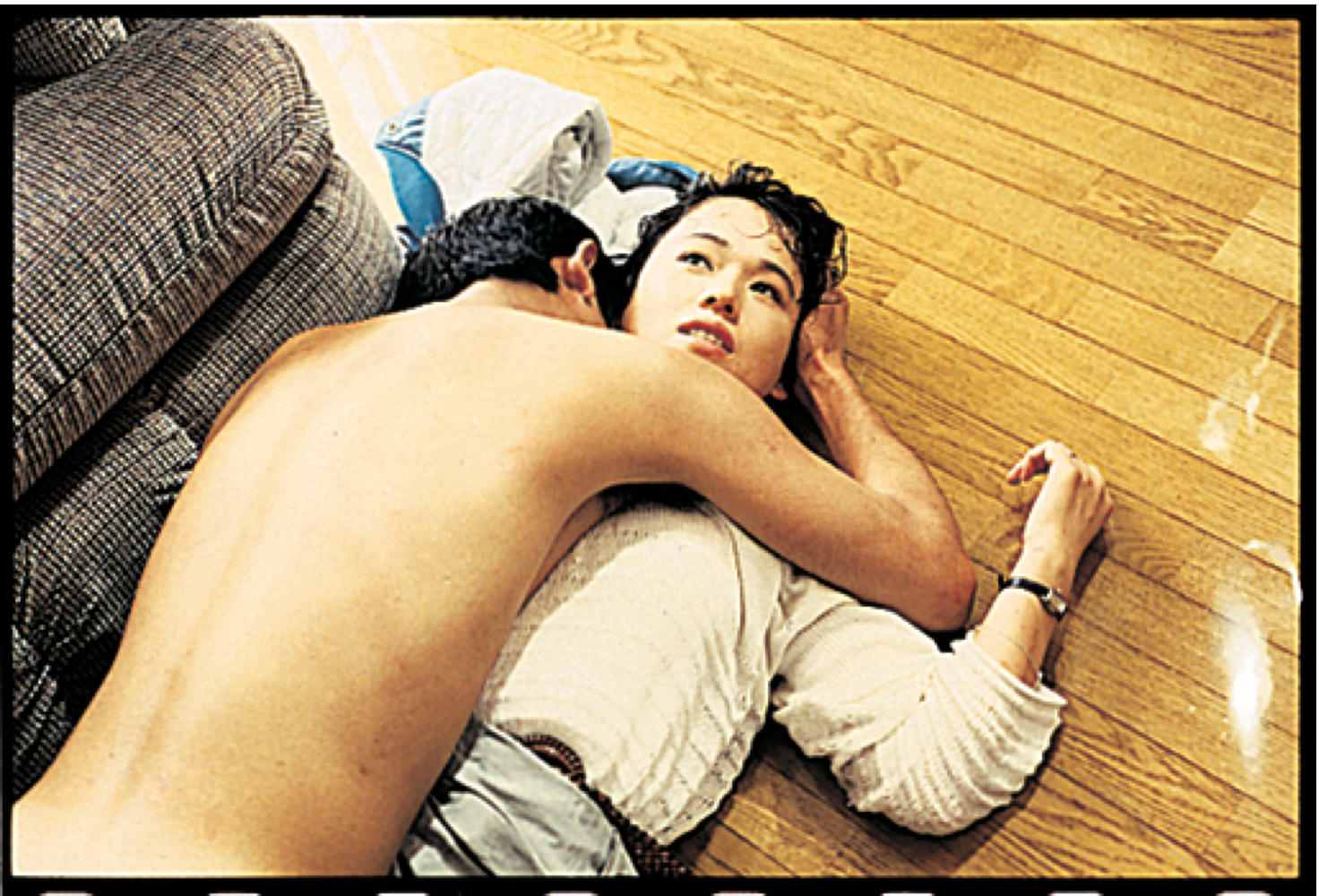
Written by Richard Durrance on 23 Jul 2025
Distributor Third Window • Certificate 18 • Price £54.99 (boxset)
Less than a week since I had started on my Takashi Ishii 4 Tales of Nami boxset odyssey, I alighted upon the fourth and final film: Original Sin.
Drifter, Makoto (Masatoshi Nagase – yes, he of the recent The Box Man), falls off the train and leaving the station finds love at first sight. The object of his amor, Nami (Shinobu Otake) works with her real estate husband Hideki (Hideo Murota), whose lives he infiltrates and his subsequent affair with Nami takes dark turns.
Based on a novel that is not James M Cain’s The Postman Always Rings Twice (it’s actually a novel by Bo Nishimura), nevertheless much of the story is to an extent a lift and shift of that story. Why not, after all Cain’s story has a universality to it: young drifter meets young women with older husband; passion ensues; husband is problematic to passion... etc. etc. etc.
Why raise this?
Because the essential quality of Original Sin, and don’t misjudge my meaning by this introduction because Original Sin is a film of quality, is how it follows aspects of the story Cain laid out (and I am sure many before him) but never traces it. In fact it draws out more sophisticated emotions and characterisations – while also sometimes keeping things necessarily simplistic - some people need to be straightforward, it drives the narrative. This statement will become clear (hopefully).
Once again, writer/director Ishii – for my money, OK I got screeners so I technically did not fork out money for this but I’m earning it writing this – turns what could be generic into something deeper and more intriguing because at the heart of the film is not a film noir thriller, as Tay Garnett’s film adaptation of Cain’s novel would be, but for me a human tragedy. This is what elevates Ishii’s film.
True, most noir is tragedy, but Original Sin works because of its beautiful shades of grey and acknowledging the depths and sophistication of human emotions. Yes, there are some disturbing aspects, Makoto’s relationship with Nami starts non-consensually, as he sexually assaults her and arguably this is perhaps the weakest part of the film, not that it is gratuitous (in many ways it illustrates Makoto’s character perfectly, as I’ll delve into) but the move from assault to consensual sex is certainly problematic at best, not that the film suggests she enjoys the act of rape but Makoto seems to offer her a physical affection that her husband is possibly not able to fulfil.

As the story progresses it becomes apparent that Nami is in love, not with either man but both of them for different reasons. Thus the tragedy. Whereas Cain’s novel has the older husband as a cuckold, a bore for his younger wife, here it is quite the opposite and, if anything, she protects him.
Nami loves both men and is stuck between them. Her husband, Hideki, is the most sympathetic of the two men. When finding out about his wife’s possible infidelity, he is not violent; angry and upset, certainly, but his love for his wife shines through. Hideki throughout shows that he is worthy of his wife, able to describe his feelings and pain with clarity, as well as his desire to make her happy.
In opposition there is Makoto, who emotionally is a child: he cannot see beyond his own emotions. He may acknowledge Nami’s love but sees it only through his eyes, he cannot empathise with her or understand her with any clarity when she tells him that she loves both him and her husband. This confession is nothing more than an impediment to him. The desire to kill her husband grows regardless of Nami's feelings which are entirely secondary to his own desires. It is the same reason why he sexually assaults her; he sees only his own passions and blames her for not understanding them. He is a closed box of a person, whereas the married couple are deeply human. It is this dynamic that makes the film so compelling.
Intriguingly, much of the story is without sex or violence, so I see Original Sin as a tragedy first and foremost. For nearly two-hours Ishii sucks you into the awful dilemma of Nami. Maybe this film was really the start of a new genre: pink noir? (You could argue it's the Japanese equivalent of Mildred Pierce - another film based on a Cain novel, a melodrama noir hybrid, it may seem like a ludicrous statement but I actually think there is something in this).
As the earliest film in the set chronologically but the last I watched (yes, I went in the Third Window disc order, a, b, c, d), it’s a great way to finish the collection. It really digs its emotional claws into you, like Alone in the Night, Ishii shows an assured directorial hand. He’s able to balance stillness with moments of stylisation, but his ability to allow his stories to play out is where they come to the fore - his attention to the emotional life of his characters and how he nuances them ensures that nothing is ever reduced to the base.
This leads to the inevitable wrap-up. I’m not going to bang on about themes or anything like that, because I think these will be pretty evident from what I’ve written about all four films, and what really matters is this is an excellent set of films which, most importantly, makes me want to try and delve through those boxed up films in my back bedroom to find where Black Angel and Gonin are hiding so that I can watch those too.
You want one more statement? I'll return to where I began, sitting in the new home, feeling weirdly adrift from where I'd been for nearly two-decades and the idea of just sitting down and watching a film was as alien as it was uncomfortable. It's almost impossible to describe how a simple thing seemed to be... awkward. Yet delving into this boxset seemed to make a new house seem like where I actually live. Sad or mad, much of my life - as it often is for people with music - merges into film. What more can you ask for?
You want a final statement? OK, buy the boxset, you won't regret it.


Long-time anime dilettante and general lover of cinema. Obsessive re-watcher of 'stuff'. Has issues with dubs. Will go off on tangents about other things that no one else cares about but is sadly passionate about. (Also, parentheses come as standard.) Looks curiously like Jo Shishido, hamster cheeks and all.
posted by Richard Durrance on 03 Sep 2025
posted by Richard Durrance on 27 Aug 2025
posted by Richard Durrance on 26 Aug 2025
posted by Richard Durrance on 11 Aug 2025
posted by Richard Durrance on 07 Aug 2025
posted by Richard Durrance on 04 Aug 2025
posted by Richard Durrance on 27 Jul 2025
posted by Richard Durrance on 21 Jul 2025